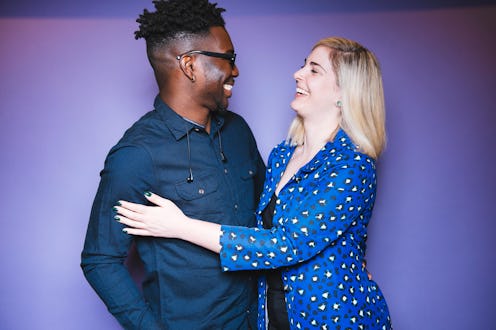Life
If You Have This Surprising Character Trait, You're More Likely To Be Trusting

Particularly when it comes to building healthy relationships, the ability to trust people is super important. However, some people are simply more trusting than others — but is there a reason why some individuals have an easier time letting their guard down and putting their faith in other people? According to a new study from researchers at Brown University, there's one trait that might really influence your ability to trust: how well you can (or can't) tolerate uncertainty.
To reach this conclusion, researchers first recruited 200 volunteers and had them play a solo gambling game as a way to measure their tolerance for risk and uncertainty. Then the participants were asked to play social games in which they had to decide whether or not to cooperate with and trust the other players. Those who had a higher ambiguity tolerance — aka those who don't mind a little uncertainty in their lives — tended to be both more trusting than other people, as well as more cooperative.
"If we consider how we go about navigating through our social worlds, we constantly need to figure out what other people are feeling and thinking," Oriel FeldmanHall, study author and an assistant professor of cognitive, linguistic and psychological sciences at Brown, said in a press release. "Even if someone tells us they are angry, they may not be telling us how angry they really are, or why they might be angry in the first place. In other words, we try to predict other people without ever having full access to their 'hidden' states."
Translation: no one is a mind reader, but if you're comfortable with things — thoughts, feelings, social situations — being left open to interpretation rather than having one black-and-white solution, you're more likely to be a trusting person. Here are three other things that might make you more likely to be trusting, according to science.
1Trusting People Tend To Be Smarter
You might assume that being too trusting is something only a fool would do, but according to a 2014 study from the University of Oxford, the opposite might be true: people who ranked higher in "generalized trust" also scored more highly on vocabulary and question comprehension. But why might intelligent people be more trusting? The researchers posited that it might be because smarter people are better able to evaluate whether or not others are trustworthy, making it less risky to be trusting themselves.
2The Older You Get, The More You're Willing To Trust
If you think you're likely to grow more jaded and distrustful as you age, you might want to think again: according to a 2015 study of collected data from the World Values Survey (of nearly 200,000 people in 83 countries), less than a quarter of 20-year-olds agreed with the statement "most people can be trusted" — but more than a third of 80-year-olds felt that most people are trustworthy.
3Trusting People Tend To Have Higher Self-Esteem
Another trait that could impact your ability to trust? Your self-esteem: according to a 2012 study of 116 participants (aged 17-27), there was a positive correlation between self-esteem and trust. The more confidence and self-worth someone had, the higher their willingness to trust was; but on the flip side, when self-esteem was low, so was confidence in oneself and in others, making them less willing to trust.
The ability to trust is so important in relationships with friends, family, co-workers, and partners. And from intelligence to confidence, the scientifically-proven personality traits associated with trust certainly aren't so bad either.